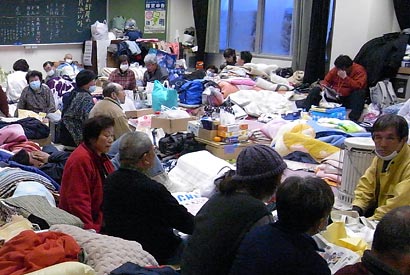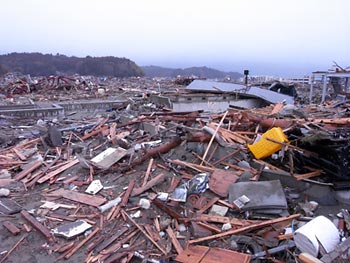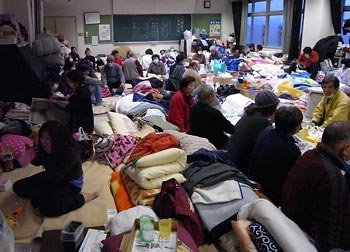Dispatch from Japan: Untold disaster stories
There are "tens of thousands" of untold stories about the March 11 Japan quake and tsunami, writes UC Berkeley Ph.D. candidate Ry Beville, who has been a researcher in Japan for four years but, following the disaster, also is working as an interpreter and with relief efforts. In his first dispatch to campus, he sends news from the devastated coastal city of Rikuzentakata.

March 31, 2011
UC Berkeley Ph.D. candidate Ry Beville has been in Japan as a researcher for four years, studying early modern Japanese literature as part of the East Asian Languages and Cultures program. He has lived a total of 11 years in Japan. Beville had planned to revisit campus this spring, but after the March 11 quake and tsunami, he chose to remain to interpret and to help with relief efforts. The following is his first dispatch to UC Berkeley Public Affairs and gives a rare look at how people are faring in small towns hit hard by the disaster.
Rikuzentakata, Japan (Mar. 25) – With most major news organizations having long since left Japan’s tsunami disaster areas to pursue other headlines, remarkable narratives of survival, acceptance and recovery are starting to emerge from witnesses to the March 11 disaster.
The destruction, of course, has been well documented. Professional camera crews circled above in helicopters, recording the tsunami as it chewed through buildings, bridges and farms. Amateur video is still appearing on the Internet as survivors increasingly are able to bring those recordings out from evacuation shelters. Photographs will continue to capture scenes from the rubble.
But few people, beyond domestic newspaper journalists, are recording the stories on the ground. There are tens of thousands of them.

Debris in the city of Rikuzentakata.
In the coastal city of Rikuzentakata, most of which was completely wiped away by the wave, I talked to a young woman who worked at the hospital. She was one of the few survivors who fled to the roof of the four-story building above the frantic cries of immobile patients being washed out the windows. She points to a gutted structure near the destroyed hospital in the distance.
“That was were I lived. All that’s gone, too,” she says. “My car washed all the way up here.”
We are at least a mile away from where her car was parked. It is completely crushed, but she is lucky someone spotted it. She needs the registration, she says, to prove to the tax department that it was indeed lost. Bureaucracy is at least still working in cruel ways.
Several miles up that same coast and through the rubble, I meet an elderly man who tells me, “I’ve been a fisherman all my life, so I think we were better prepared for the tsunami. We went up the hill immediately and watched as it came in. When it struck the breakwall (intended to protect against tsunami) and just exploded over it, we turned around and ran higher up.”
In this port town, like others in the region, there are no boats left. His future as a fisherman is uncertain at best.
After delivering supplies to a nearby evacuation center at an elementary school, I sit with some fishermen outside, who are circled around a fire. “We need boots,” they say. Coincidentally, I am trying to help several footwear companies coordinate the delivery of 13,000 boots and shoes they have donated to appropriate evacuation shelters. This is one of them. I speak with a director, a minor town official.
“Well, there are evacuation shelters all over, and for just us to receive the shoes wouldn’t be fair. I need to talk about it with other officials,” he says.

Residents of an evacuation shelter.
He obviously hasn’t seen the evacuation shelter across town, which has become a media magnet with its complimentary hot tubs, dentist, barber and massage mats. But this director won’t even ask the 350 people he is responsible for to list what size shoes they need. Evacuees with more resourceful leaders fare much better. They are getting shoes delivered to them. But can you blame him? He’s a minor bureaucrat, not a relief specialist. He only knows to ask someone higher up.
Surprisingly, when I tell the fishermen the results of my inquiry, they all just laugh it off: “If you go through him or anyone at town hall, we may never get the shoes!”
The ability to laugh things off might seem strange to some. Obviously, tens of thousands of people are still dealing with enormous loss (the number of dead and missing will top 20,000), but a laugh as if to say ‘This is just the way it is” seems to be the prevailing response.
Other reporters have asked, “Are the Japanese unique? Is their resilience and acceptance unlike that of people in any other country or culture?” I would certainly hesitate to exceptionalize Japanese in this way, but it’s hard not to believe that such responses to unprecedented destruction and great loss of life are not somehow rooted in the ethnos of the country. Cherry blossoms are celebrated for their transient beauty and are a metaphor for the frailty of human existence. Centuries of literature in Japan have pursued this motif. In Hôjôki, an early 13th century work, Kamo no Chômei writes of an earthquake, famine and fire that strike the ancient capital. Many Japanese are at least familiar with the opening lines: “Ceaselessly the river flows, but the water is never the same. Bubbles float to the surface of current pools, bursting and reforming without end. So, too, are the people and the houses of this world.”
Even Japanese who have forgotten this segment of required school curriculum would know the proverb, “Fall down seven times, stand up eight.”
In a rapidly aging population, though, some are starting to question the point in going on after a disaster. An elderly woman in northern coastal city of Kuji looks at the rubble of her house and tells me, “If I were younger, I’d rebuild. I don’t see the point now.” She politely thanks a wrecking crew for piling the remains of her home in a dump truck and bows low as the men drive off. She trudges up the hillside, her back hunched, to stay with a relative.
She will likely live the rest of her life there. She is one of the lucky ones.